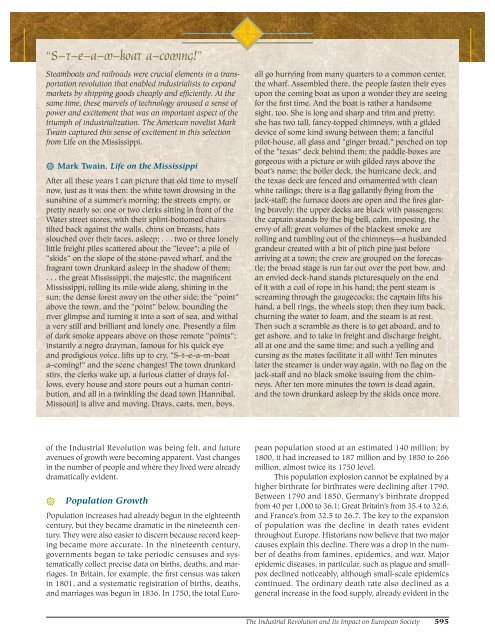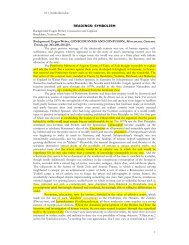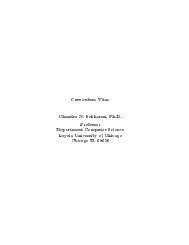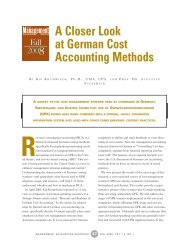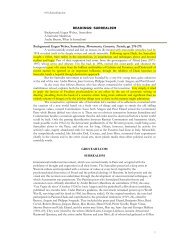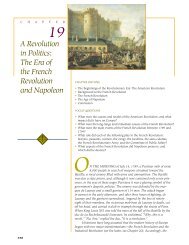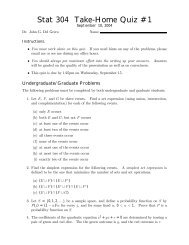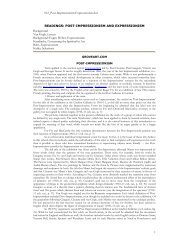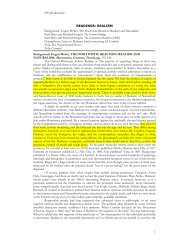20 The Industrial Revolution and Its Impact on European Society
20 The Industrial Revolution and Its Impact on European Society
20 The Industrial Revolution and Its Impact on European Society
Create successful ePaper yourself
Turn your PDF publications into a flip-book with our unique Google optimized e-Paper software.
“S–t–e–a–m–boat a–coming!”<br />
Steamboats <str<strong>on</strong>g>and</str<strong>on</strong>g> railroads were crucial elements in a transportati<strong>on</strong><br />
revoluti<strong>on</strong> that enabled industrialists to exp<str<strong>on</strong>g>and</str<strong>on</strong>g><br />
markets by shipping goods cheaply <str<strong>on</strong>g>and</str<strong>on</strong>g> efficiently. At the<br />
same time, these marvels of technology aroused a sense of<br />
power <str<strong>on</strong>g>and</str<strong>on</strong>g> excitement that was an important aspect of the<br />
triumph of industrializati<strong>on</strong>. <str<strong>on</strong>g>The</str<strong>on</strong>g> American novelist Mark<br />
Twain captured this sense of excitement in this selecti<strong>on</strong><br />
from Life <strong>on</strong> the Mississippi.<br />
Mark Twain, Life <strong>on</strong> the Mississippi<br />
After all these years I can picture that old time to myself<br />
now, just as it was then: the white town drowsing in the<br />
sunshine of a summer’s morning; the streets empty, or<br />
pretty nearly so; <strong>on</strong>e or two clerks sitting in fr<strong>on</strong>t of the<br />
Water street stores, with their splint-bottomed chairs<br />
tilted back against the walls, chins <strong>on</strong> breasts, hats<br />
slouched over their faces, asleep; . . . two or three l<strong>on</strong>ely<br />
little freight piles scattered about the “levee”; a pile of<br />
“skids” <strong>on</strong> the slope of the st<strong>on</strong>e-paved wharf, <str<strong>on</strong>g>and</str<strong>on</strong>g> the<br />
fragrant town drunkard asleep in the shadow of them;<br />
. . . the great Mississippi, the majestic, the magnificent<br />
Mississippi, rolling its mile-wide al<strong>on</strong>g, shining in the<br />
sun; the dense forest away <strong>on</strong> the other side; the “point”<br />
above the town, <str<strong>on</strong>g>and</str<strong>on</strong>g> the “point” below, bounding the<br />
river glimpse <str<strong>on</strong>g>and</str<strong>on</strong>g> turning it into a sort of sea, <str<strong>on</strong>g>and</str<strong>on</strong>g> withal<br />
a very still <str<strong>on</strong>g>and</str<strong>on</strong>g> brilliant <str<strong>on</strong>g>and</str<strong>on</strong>g> l<strong>on</strong>ely <strong>on</strong>e. Presently a film<br />
of dark smoke appears above <strong>on</strong> those remote “points”;<br />
instantly a negro drayman, famous for his quick eye<br />
<str<strong>on</strong>g>and</str<strong>on</strong>g> prodigious voice, lifts up to cry, “S–t–e–a–m–boat<br />
a–coming!” <str<strong>on</strong>g>and</str<strong>on</strong>g> the scene changes! <str<strong>on</strong>g>The</str<strong>on</strong>g> town drunkard<br />
stirs, the clerks wake up, a furious clatter of drays follows,<br />
every house <str<strong>on</strong>g>and</str<strong>on</strong>g> store pours out a human c<strong>on</strong>tributi<strong>on</strong>,<br />
<str<strong>on</strong>g>and</str<strong>on</strong>g> all in a twinkling the dead town [Hannibal,<br />
Missouri] is alive <str<strong>on</strong>g>and</str<strong>on</strong>g> moving. Drays, carts, men, boys,<br />
all go hurrying from many quarters to a comm<strong>on</strong> center,<br />
the wharf. Assembled there, the people fasten their eyes<br />
up<strong>on</strong> the coming boat as up<strong>on</strong> a w<strong>on</strong>der they are seeing<br />
for the first time. And the boat is rather a h<str<strong>on</strong>g>and</str<strong>on</strong>g>some<br />
sight, too. She is l<strong>on</strong>g <str<strong>on</strong>g>and</str<strong>on</strong>g> sharp <str<strong>on</strong>g>and</str<strong>on</strong>g> trim <str<strong>on</strong>g>and</str<strong>on</strong>g> pretty;<br />
she has two tall, fancy-topped chimneys, with a gilded<br />
device of some kind swung between them; a fanciful<br />
pilot-house, all glass <str<strong>on</strong>g>and</str<strong>on</strong>g> “ginger bread,” perched <strong>on</strong> top<br />
of the “texas” deck behind them; the paddle-boxes are<br />
gorgeous with a picture or with gilded rays above the<br />
boat’s name; the boiler deck, the hurricane deck, <str<strong>on</strong>g>and</str<strong>on</strong>g><br />
the texas deck are fenced <str<strong>on</strong>g>and</str<strong>on</strong>g> ornamented with clean<br />
white railings; there is a flag gallantly flying from the<br />
jack-staff; the furnace doors are open <str<strong>on</strong>g>and</str<strong>on</strong>g> the fires glaring<br />
bravely; the upper decks are black with passengers;<br />
the captain st<str<strong>on</strong>g>and</str<strong>on</strong>g>s by the big bell, calm, imposing, the<br />
envy of all; great volumes of the blackest smoke are<br />
rolling <str<strong>on</strong>g>and</str<strong>on</strong>g> tumbling out of the chimneys—a husb<str<strong>on</strong>g>and</str<strong>on</strong>g>ed<br />
gr<str<strong>on</strong>g>and</str<strong>on</strong>g>eur created with a bit of pitch pine just before<br />
arriving at a town; the crew are grouped <strong>on</strong> the forecastle;<br />
the broad stage is run far out over the port bow, <str<strong>on</strong>g>and</str<strong>on</strong>g><br />
an envied deck-h<str<strong>on</strong>g>and</str<strong>on</strong>g> st<str<strong>on</strong>g>and</str<strong>on</strong>g>s picturesquely <strong>on</strong> the end<br />
of it with a coil of rope in his h<str<strong>on</strong>g>and</str<strong>on</strong>g>; the pent steam is<br />
screaming through the gaugecocks; the captain lifts his<br />
h<str<strong>on</strong>g>and</str<strong>on</strong>g>, a bell rings, the wheels stop; then they turn back,<br />
churning the water to foam, <str<strong>on</strong>g>and</str<strong>on</strong>g> the steam is at rest.<br />
<str<strong>on</strong>g>The</str<strong>on</strong>g>n such a scramble as there is to get aboard, <str<strong>on</strong>g>and</str<strong>on</strong>g> to<br />
get ashore, <str<strong>on</strong>g>and</str<strong>on</strong>g> to take in freight <str<strong>on</strong>g>and</str<strong>on</strong>g> discharge freight,<br />
all at <strong>on</strong>e <str<strong>on</strong>g>and</str<strong>on</strong>g> the same time; <str<strong>on</strong>g>and</str<strong>on</strong>g> such a yelling <str<strong>on</strong>g>and</str<strong>on</strong>g><br />
cursing as the mates facilitate it all with! Ten minutes<br />
later the steamer is under way again, with no flag <strong>on</strong> the<br />
jack-staff <str<strong>on</strong>g>and</str<strong>on</strong>g> no black smoke issuing from the chimneys.<br />
After ten more minutes the town is dead again,<br />
<str<strong>on</strong>g>and</str<strong>on</strong>g> the town drunkard asleep by the skids <strong>on</strong>ce more.<br />
of the <str<strong>on</strong>g>Industrial</str<strong>on</strong>g> <str<strong>on</strong>g>Revoluti<strong>on</strong></str<strong>on</strong>g> was being felt, <str<strong>on</strong>g>and</str<strong>on</strong>g> future<br />
avenues of growth were becoming apparent. Vast changes<br />
in the number of people <str<strong>on</strong>g>and</str<strong>on</strong>g> where they lived were already<br />
dramatically evident.<br />
<br />
Populati<strong>on</strong> Growth<br />
Populati<strong>on</strong> increases had already begun in the eighteenth<br />
century, but they became dramatic in the nineteenth century.<br />
<str<strong>on</strong>g>The</str<strong>on</strong>g>y were also easier to discern because record keeping<br />
became more accurate. In the nineteenth century,<br />
governments began to take periodic censuses <str<strong>on</strong>g>and</str<strong>on</strong>g> systematically<br />
collect precise data <strong>on</strong> births, deaths, <str<strong>on</strong>g>and</str<strong>on</strong>g> marriages.<br />
In Britain, for example, the first census was taken<br />
in 1801, <str<strong>on</strong>g>and</str<strong>on</strong>g> a systematic registrati<strong>on</strong> of births, deaths,<br />
<str<strong>on</strong>g>and</str<strong>on</strong>g> marriages was begun in 1836. In 1750, the total <strong>European</strong><br />
populati<strong>on</strong> stood at an estimated 140 milli<strong>on</strong>; by<br />
1800, it had increased to 187 milli<strong>on</strong> <str<strong>on</strong>g>and</str<strong>on</strong>g> by 1850 to 266<br />
milli<strong>on</strong>, almost twice its 1750 level.<br />
This populati<strong>on</strong> explosi<strong>on</strong> cannot be explained by a<br />
higher birthrate for birthrates were declining after 1790.<br />
Between 1790 <str<strong>on</strong>g>and</str<strong>on</strong>g> 1850, Germany’s birthrate dropped<br />
from 40 per 1,000 to 36.1; Great Britain’s from 35.4 to 32.6,<br />
<str<strong>on</strong>g>and</str<strong>on</strong>g> France’s from 32.5 to 26.7. <str<strong>on</strong>g>The</str<strong>on</strong>g> key to the expansi<strong>on</strong><br />
of populati<strong>on</strong> was the decline in death rates evident<br />
throughout Europe. Historians now believe that two major<br />
causes explain this decline. <str<strong>on</strong>g>The</str<strong>on</strong>g>re was a drop in the number<br />
of deaths from famines, epidemics, <str<strong>on</strong>g>and</str<strong>on</strong>g> war. Major<br />
epidemic diseases, in particular, such as plague <str<strong>on</strong>g>and</str<strong>on</strong>g> smallpox<br />
declined noticeably, although small-scale epidemics<br />
c<strong>on</strong>tinued. <str<strong>on</strong>g>The</str<strong>on</strong>g> ordinary death rate also declined as a<br />
general increase in the food supply, already evident in the<br />
<str<strong>on</strong>g>The</str<strong>on</strong>g> <str<strong>on</strong>g>Industrial</str<strong>on</strong>g> <str<strong>on</strong>g>Revoluti<strong>on</strong></str<strong>on</strong>g> <str<strong>on</strong>g>and</str<strong>on</strong>g> <str<strong>on</strong>g>Its</str<strong>on</strong>g> <str<strong>on</strong>g>Impact</str<strong>on</strong>g> <strong>on</strong> <strong>European</strong> <strong>Society</strong> 595


